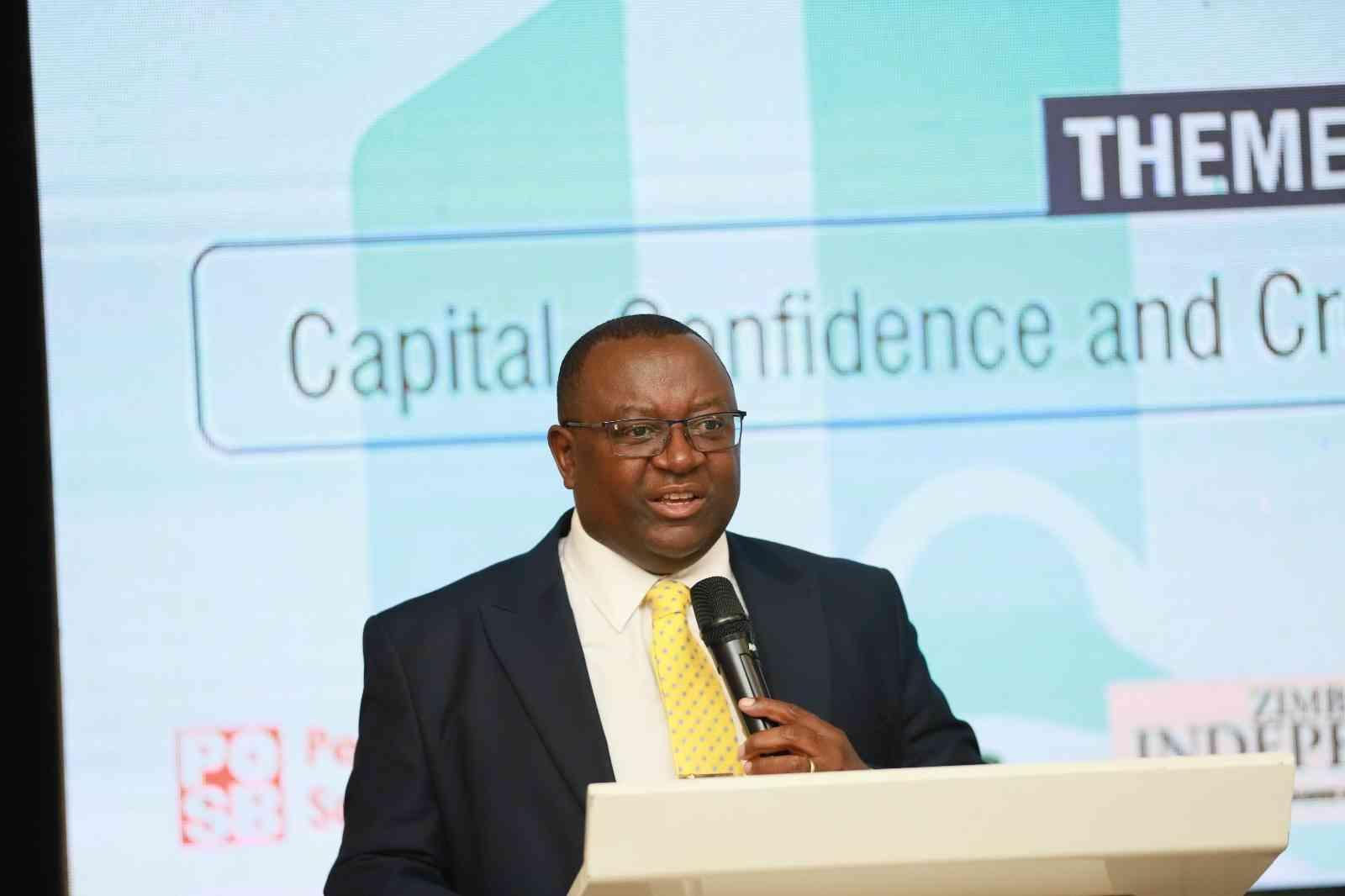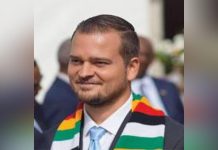By Tatira Zwinoira and GARY GERALD MTOMBENI and Donald Nyandoro
Africa-Press – Zimbabwe. Welcome to the Zimbabwe Independent Banks & Banking Sector Survey, 2025, sponsored by the POSB Bank and NBS at Sabre Business World in Highlands, Harare. This year’s theme is: CAPITAL, CONFIDENCE, AND CREDIT MARKET DYNAMICS
Welcoming guests, Alpha Media Chief Executive, Kenias Mafukidze said: The Bank & Banking Sector Survey 2025 is an active assessment of the sector’s health and dynamics, by highlighting the best practises in areas of improvement, it fosters a more robust banking sector in Zimbabwe. We are proud as AMH to recognise achievements in digital transformation, financial inclusion and ESG principles, setting benchmarks for the industry’s future. This event drives positive energy and competition and progress in banking sector.
The sector as we know is clearly the customer. A lot of the awards today will be recognising the customer. But I think it’s fair to say with where we are in this day and age, it’s clear that the future of finance will not be the same for the last 100 to 200 years.
Fiat money as we know it is transforming and changing. There’s a lot of new products coming, there are tokens coming through, there are more issues in terms of blockchain technology. So it is only those who are willing to embrace the future, it is only those who recognise that banking is no longer, or most of it is no longer within the four walls, that will own the future.
So the future we believe belongs to innovation, the future belongs to people who can create a new reality and embrace what’s going on.
POSB Chief Executive, Garainashe Changunda takes to the floor:
As the lead sponsor for this year’s edition, POSB is truly honoured to support a tradition that celebrates the best in banking.
We also wish to recognise and sincerely thank our co-sponsor — the National Building Society (NBS) — and to express our appreciation to previous sponsors, including First Capital Bank, for the important role they have played in sustaining this event. Your commitment over the years has ensured that this platform continues to inspire growth, collaboration, and excellence across the industry.
While this initiative is the brainchild of The Zimbabwe Independent, it is meant for us bankers — and for the banking sector at large. Therefore, we must all play a role in sustaining it. We at POSB found it prudent to support the initiative this year, taking over from the previous sponsors.
We are privileged this morning to share the room with many leaders and colleagues from across the banking sector — partners with whom we share the responsibility of driving economic transformation and financial inclusion. Your presence reflects the shared confidence we all have in the strength and future of Zimbabwe’s financial system.
This year’s theme, “Capital, Confidence and Credit Market Dynamics,” speaks directly to the heart of our industry.Capital represents the foundation of stability and growth. Confidence is the bond of trust that connects us with our customers and investors. And credit market dynamics remind us that we operate in an ever-evolving environment that requires agility, innovation, and collaboration.
In recent years, our financial sector has shown remarkable resilience. Colleagues, despite economic headwinds, we have collectively continued to support businesses, households, and communities — reaffirming that Zimbabwe’s banking sector remains a pillar of national development.
At POSB, we are especially proud of our role in promoting financial inclusion and ensuring that every Zimbabwean — from the urban entrepreneur to the rural smallholder farmer — has access to safe, affordable, and reliable banking services.
Today, we celebrate the banks and individuals who have distinguished themselves through innovation, performance, and service.
To all the award winners — congratulations. Your achievements are not just personal victories; they are a reflection of the collective progress we continue to make as an industry.
The guest of Honour Dr. Nebson Mupunga, the RBZ Director – Economic Research, Modelling & Policy, takes to the floor to present on CAPITAL, CONFIDENCE, & CREDIT MARKET DYNAMICS IN THE FINANCIAL SERVICES SECTOR
Dr. Nebson Mupunga, the RBZ Director – Economic Research, Modelling & Policy We will be expected to convert to seek and transact domestically in seek. But if you didn’t want to make a foreign payment, if you didn’t want to travel outside, you would then go to your bank or to any authorized foreign exchange dealer and exchange and you get a foreign currency which you can then use. But for that to happen, there are certain conditions that authorities, that is government and Reserve Bank are putting in place to ensure that the transition to mono-currency will be a success.
We don’t want it to fail again like the past currency reform episodes. And there are certain conditions that authorities are working on to ensure that the transition to mono-currency by 2030 will be smooth. So, the first condition is to ensure that there is durable macroeconomic stability.
And this will be characterized by low and stable inflation at single digit levels. So our projections are showing us that if we continue with the trajectory that we have seen from February up to now by January moving in single digit inflation level, that is what we are actually expecting and what we are seeing on the ground. So, we then aim to sustain inflation at those lower levels until 2030.
And if we are able to do that, it means one of the conditions necessary for transitioning to mono-currency would have been made. The other condition is to have adequate foreign currency reserves. Internationally, they say that if we have at least three months of import cover in terms of reserves, we will be fine.
But we are anticipating to have at least six months of import curve, so that we’ll be able to deal with any potential shock that may destabilize the zig as we transition to mono-currency.
The Financial Director, of NBS, one of the key sponsors of this year’s awards, Mukai Mahachi: As NBS, we reaffirm our commitment, not just to banking, but to building a financially inclusive nation. As we move into the second phase of our national development agenda, the rallying call for us as financial institutions is to ensure that the deepening of the financial services sector and of course infrastructure and housing development. For us, financial deepening is about reaching the underserved online banks.
We are actively expanding our digital footprint and tailoring products to onboard individuals who traditionally remain outside the formal financial system. By providing access to secure savings and credits, we convert dormant capital into active, productive resources. That’s broadly the financial base for all.
When it comes to housing delivery, we believe that housing is more than just a commodity. It is the fundamental human rights and the power of the economics that we live in. This is the very mantle for which the MBS was created.
We are committed to closing the gap between aspiration and home ownership for the average Zimbabwean. We are moving beyond traditional models by partnering with developers, pension funds and local account to ensure that our housing projects are affordable, accessible and scalable. While all the banks here present play a vital role in providing short-term financing and working capital, the national need for sustainable, long-term housing finance remains a niche.
Housing projects, by their very nature, require long-term capital financing. The current marketing towards short-term, high-interest financing ultimately makes housing unaffordable and inaccessible. Following both our sector’s growth and our nation’s housing backlog efforts.
At MBS, we have been very intentional in our strategy to be at the forefront of structuring and underwriting mortgages with long Italians. This shift reduces monthly payments, improves affordability and provides the certainty required for families to plan for their future. This is not a burden, it is an investment, an investment in stable communities, in robust, long-term assets and in the enduring economic resilience of Zimbabwe.
As the National Building Society, we have a particular stake in today’s proceedings. In 2024, we were honored to receive the award for the Best Building Society. That recognition was heartwarming and humbling.
It also came with a responsibility to be even better in the way we serve those who trust us with their business. Today, we are here not just to celebrate past achievements, but to measure against our continued performance. This is the spirit that drives progress in our sector and the economy at large.
So, to all the financial institutions represented here today, I extend my sincere best wishes to you. May the best performance be recognized and may we all meet here with insights that enable us to better serve our customers and our economy.
If our approach is market-led, then that means 2030 should be informed by the markets. If it can’t be market-led, we’re not talking about 2030. In fact, I think 2030 is the proper year.
Because we might also want to know where 2030 came from. 2030 used to be 2025, I think we all know. When we got closer to 2025, it was not the turning point and it was pushed to 2030.
I’m sure that as we get to 2030, this debt is going to increase, probably in 2035. So I think we should move away from looking at 2030, but let us talk about the fundamentals. So now, what it means is, this issue of monocurrency should be fundamental debt, and not a debt-like best.
In my personal view, we are not going to have a monocurrency in 2030, probably in 2035 or 2040, because we say it’s market-led. The market, I think, is speaking in this region. The market is not ready for that, and if you are listening to the market, obviously, I’m sure we are going to make ambitions to it.
Then that is number one. Then number two, I think you also have a problem. By just saying monocurrency, that is a big, very big problem.
If you look, you’ll find that monocurrencys in Zimbabwe are terrible. It’s only in Zimbabwe that you talk about monocurrency. There is no currency that is a monocurrency.
The USD, in fact, that also brings confusion. We are talking about monocurrency by 2030. Are you saying the USD is not going to be there? Obviously, the USD will be there.
It’s part of the Danish system. And by the way, 83% of M3 is USD. That’s not going to change by 2030.
We’re not going to get to 50% by 2030. We need more time, especially if you want this to be market-led. So now, there is a fundamental value represented here.
At the moment, they don’t have a numerical number. It’s only in Zimbabwe that there is 3 to 6 monocurrency. But in the rest, that’s very subjective.
We don’t even know how they’re going to be bringing stability. We don’t know the indicator. Most of the variables that are given there.
I think that is where we should be going now. If the police now start approaching the whole issue of… In fact, Zimbabwe is now moving away from the way of de-dollarisation. And they are now bringing monocurrency.
I think that’s a very big blow to confidence in the market. Let’s not talk about monocurrency. Even if we still benefit, the USD will still be part of our currency.
Even if we say we change it first in order to do transactions. But you still have it. If you want to keep your foreign currency account, you keep it in USD.
So, let’s do away with monocurrency. It’s not good at all. Let’s talk about de-dollarisation.
And we say, when we’re talking about de-dollarisation, we’re talking about a gradual decrease in the dominance of the USD. Market-like dominance of ZiG compared to USD. That one, no one will be worried.
But the moment you start saying monocurrency, you are giving the impression that we are dealing away with USD. Which I’m sure they don’t mean. They talk about monocurrency, but they actually… We don’t even know how that word is defined.
Let’s say… This is largely used for debuffing. If we try to Google, we discover that all texts about monocurrents are being used for debuffing. We should use terms that have been used in other countries.
And they all have the same pattern. Let’s not debate currencies to try to move away from the dominance of USD to our currency. Let’s try to use terms that are comparable.
So that if this is okay, we can also take examples from other countries to try to see if you are moving in.
Real estate developer, Ken Sharpe’s presentation focused on two main themes — “Trust and the Future” — and what he called “the elephant in the room”, Zimbabwe’s currency policy.1. Trust and the Future• Sharpe began by linking trust to longevity and stability, drawing an analogy with the baobab trees he has transplanted at his $380 million Hills Estate project in Harare — trees that can live for thousands of years.• He likened this endurance to what Zimbabwe’s financial systems should aspire to: building trust that lasts for generations, not just years.• Wealth creation, he said, takes centuries, and Africa must catch up and leapfrog the rest of the world by focusing on long-term growth.• He shared a story about mentoring 25 young Zimbabweans, most of whom initially wanted to emigrate but changed their minds after seeing local progress.• Sharpe said what keeps him motivated is the future, specifically his company’s “Billion Brick Vision by 2050.”• He urged the Reserve Bank and financial institutions to focus beyond short-term deadlines, arguing that Zimbabwe’s future extends well beyond 2030.• • 2. The Elephant in the Room – Currency Confidence and Policy• Sharpe tackled the issue of de-dollarization and monetary trust.• Using Israel as an example, he said successful de-dollarization took two decades, and Zimbabwe must be realistic about its timeline.• He warned that the Statutory Instrument (SI) declaring the use of US dollars only until 2030 undermines confidence and prevents banks from issuing long-term loans.• He called on the Reserve Bank of Zimbabwe to remove the 2030 deadline if it truly wants a market-led currency transition.• He emphasized that real markets depend on freedom of choice — if people want to transact in US dollars, they should be allowed to.• • 3. Real Estate and Economic Opportunity• Sharpe identified real estate as Zimbabwe’s largest untapped source of wealth.• He estimated there are one million homes without mortgages, worth about US$100 billion in assets.• In normal economies, real estate contributes around 12% of GDP, while in Zimbabwe it’s only 1–2%.• Introducing long-term mortgage financing (e.g., 30-year loans) could inject US$20 billion into the economy and potentially add US$60 billion to GDP, effectively doubling the economy.• However, he warned that this requires foreign credit lines, which depend on investor confidence — particularly confidence that US dollars will remain legal beyond 2030.Sharpe urged Zimbabwe’s policymakers to:• Build trust that endures for generations.• Look beyond 2030 and adopt a long-term national vision.• Foster market freedom and confidence to attract foreign capital.• Use real estate and mortgage financing as engines of sustainable economic growth.His central message: Zimbabwe’s progress depends on trust in the future, realistic policy timelines, and confidence-building measures that invite investment rather than restrict it.
To the awards!
Digital Banking Transformation categoryNominees:First Capital BankNMB Bank,Nedbank
Runner up: NMB BankWinner: Nedbank
Best Overall Bank for Financial Inclusion
NomineesTN CyberbankCABSAFC Bank
Runner-up: CabsWinner: AFC Bank
Best Overall ESG Bank
Runner-up: NedbankWinner: CBZ Bank
Top Performing Bank (Local)
Nominees:ZB BankBZ BankFBC BankNMB Bank
Runner-Up: CBZ BankWinner: FBC Bank
Top Performing Bank (International)
Nominees:Stanbic BankEcobankNedbankFirst Capital Bank
Runner-up: EcobankWinner: First Capital Bank
Outstanding Leadership Award in Banking
Runner-up: Solomon Nyanhongo Stanbic Bank CEOWinner: Moses Kurenje (MD, Ecobank
This blog has closed
Source: NewsDay
For More News And Analysis About Zimbabwe Follow Africa-Press






